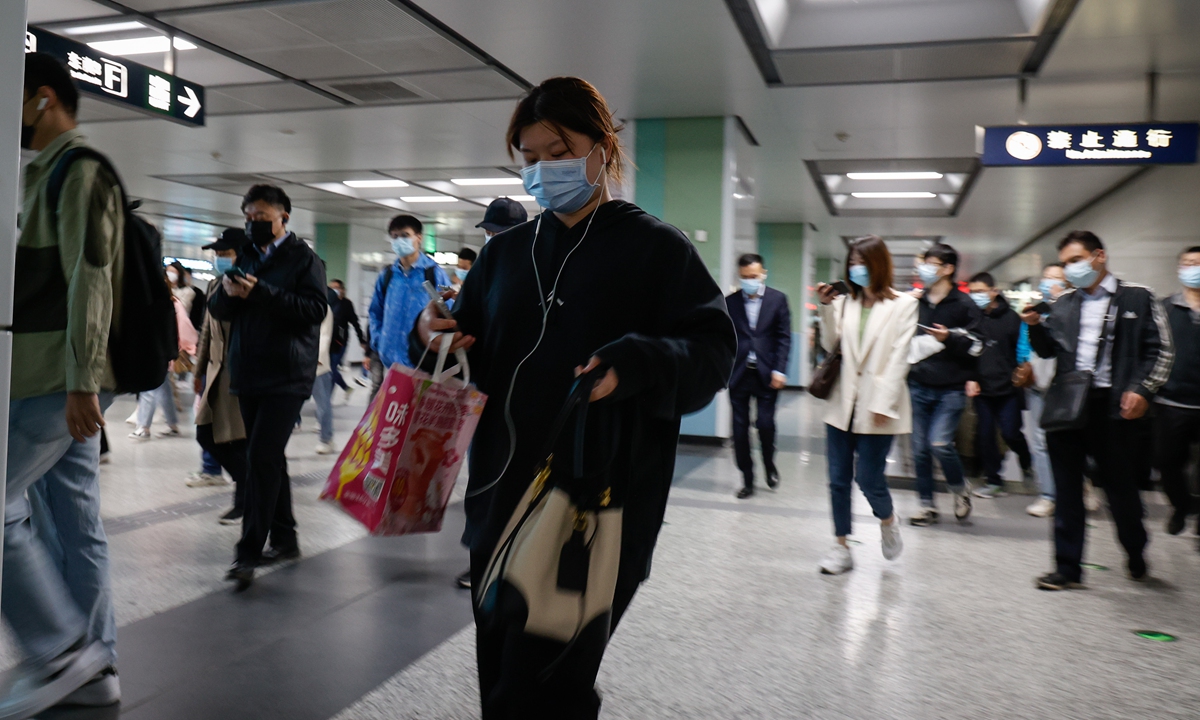
People ride the subway in Beijing on April 26, 2022. Photo: IC
From theaters to restaurants to tourism sites, many consumer businesses in Beijing are adjusting their operations, with some halting businesses and others controlling visitor flows to stamp out risks, as the Chinese capital sees rising numbers of confirmed COVID-19 cases in recent days.
However, there have been no widespread business closures, as officials strive to minimize economic disruptions, and consumption will likely bounce back once the latest outbreak is brought under effective control, experts said on Tuesday.
Local officials announced on Monday that the city would halt theatrical performances, sports matches, exhibitions, on-site education training courses and scattered construction projects. Beijing's tourism department also requested a halt of group travel in the city.
Following government policies, business entities started to take action immediately. Liu Wenjun, an employee from Prince Gong's Palace Museum, a famous tourist site in Beijing, told the Global Times that the museum won't take tour groups as requested by officials, but will still accept individual tourists.
Liu said that the museum has been actively implementing the Beijing municipal government's COVID-19 prevention policies, including health code checks and disinfection. It has also limited tourist flows to about 75 percent of its maximum capacity.
A staffer at the Beijing Universal Resort said on Tuesday that the resort is open to the public according to anti-epidemic policies, and it has not received any order to close during the May Day holidays.
"[Anti-epidemic measures] at the resort have been published on our official social media accounts, and guests will not be allowed to enter if they violate any of those regulations," the staffer told the Global Times.
According to the measures, people who have passed or visited mid- and high-risk regions in the past 21 days, who have visited foreign countries and regions in the past 28 days, and those who have had contact with COVID-19 patients will not be allowed to enter the resort.
The staffer also noted that guests must book a time slot before entry, a policy that the resort has implemented since September 2021.
Meanwhile, some tourist sites halted businesses to prevent the spread of the COVID-19. Beijing's Yong He Gong Lama Temple, for example, issued a notice on Tuesday saying that it will stop accepting tourists as of Wednesday to "guarantee the safety of tourists, believers and its employees." The reopening time will be announced to the public later, the notice said.
Apart from tourist sites, many theaters in the city also moved to halt business operations temporarily. The Beijing People's Art Theatre, for instance, announced plans to cancel all performances between Tuesday and April 30.
Many restaurants in Beijing didn't stop services in general, but took extra measures to stop the spread of COVID-19.
A restaurant in Beijing's Chaoyang district told the Global Times on Tuesday that operations were normal, but the restaurant wouldn't seat too many guests at one table while conducting routine anti-epidemic policies. The same was true at another branch in Dongcheng district.
Beijing had seen a rise of confirmed COVID-19 cases in recent days. On Monday, the city reported 32 new confirmed cases and one asymptomatic patient.
The Chinese capital's COVID-19 surge casts another shadow over the country's consumption sector, which is already under strong downward pressure due to the outbreaks of Omicron cases in Shanghai in recent days.
Industry insiders said that their concern is more about the impact of the situation on consumers' sentiment than about the direct loss of income around the May Day holidays.
Xu Xiaolei, marketing manager at China's CYTS Tours Holding Co, told the Global Times that since his company's business had shifted toward customized travel to a great extent, and traditional short-distance group tours only accounted for a small proportion of the firm's business, the new policy wouldn't affect its revenues to a great extent.
"What we really worry is whether the anti-epidemic measures and the epidemic situation will make people unwilling to travel to some extent," he said.
Zhao Ping, vice president of the Academy of the China Council for the Promotion of International Trade, told the Global Times that the major problem faced by China's consumption sector is weakening anticipation and shrinking demand.
Zhao stressed that more policy support must be rolled out to stabilize the job market and ensure income growth, so as to make people more confident about spending money.




